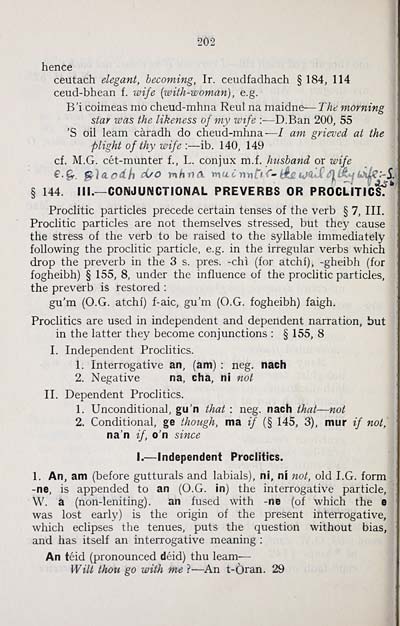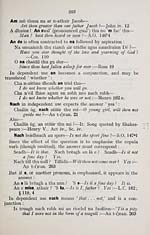Matheson Collection > Gaelic grammar, containing the parts of speech and the general principles of phonology and etymology, with a chapter on proper and place names
(222)
Download files
Complete book:
Individual page:
Thumbnail gallery: Grid view | List view

202
hence
ceutach elegant, becoming, Ir. ceudfadhach § 184, 114
ceud-bhean f. wife (with-woman), e.g.
B'i coimeas mo cheud-mhna Reul na maidne — The morning
star was the likeness of my wife :■ — D.Ban 200, 55
'S oil learn càradh do cheud-mhna- — / am grieved at the
plight of thy wife :— ib. 140, 149
cf. M.G. cet-munter f., L. conjux m.f. husband or wife
§ 144. III.— CONJUNCTIONAL PREVERBS OR PROCLÌTICsf*
Proclitic particles precede certain tenses of the verb § 7, III.
Prochtic particles are not themselves stressed, but they cause
the stress of the verb to be raised to the syllable immediately
following the proclitic particle, e.g. in the irregular verbs which
drop the preverb in the 3 s. pres. -chi (for atchi), -gheibh (for
fogheibh) § 155, 8, under the influence of the prochtic particles,
the preverb is restored :
gu'm (O.G. atchi) f-aic, gu'm (O.G. fogheibh) faigh.
Proclitics are used in independent and dependent narration, but
in the latter they become conjunctions : § 155, 8
I. Independent Proclitics.
1. Interrogative an, (am) : neg. nach
2. Negative na, cha, ni not
II. Dependent Proclitics.
1. Unconditional, gu'n that : neg. nach that — not
2. Conditional, ge though, ma if (§ 145, 3), mur if not,
na'n if, o'n since
I. — Independent Proclitics.
1. An, am (before gutturals and labials), ni, ni not, old I.G. form
-ne, is appended to an (O.G. in) the interrogative particle,
W. à (non-leniting) . an fused with -ne (of which the e
was lost early) is the origin of the present interrogative,
which eclipses the tenues, puts the question without bias,
and has itself an interrogative meaning :
An tèid (pronounced deid) thu learn —
Wilt thou go with me ? — An t-Òran. 29
hence
ceutach elegant, becoming, Ir. ceudfadhach § 184, 114
ceud-bhean f. wife (with-woman), e.g.
B'i coimeas mo cheud-mhna Reul na maidne — The morning
star was the likeness of my wife :■ — D.Ban 200, 55
'S oil learn càradh do cheud-mhna- — / am grieved at the
plight of thy wife :— ib. 140, 149
cf. M.G. cet-munter f., L. conjux m.f. husband or wife
§ 144. III.— CONJUNCTIONAL PREVERBS OR PROCLÌTICsf*
Proclitic particles precede certain tenses of the verb § 7, III.
Prochtic particles are not themselves stressed, but they cause
the stress of the verb to be raised to the syllable immediately
following the proclitic particle, e.g. in the irregular verbs which
drop the preverb in the 3 s. pres. -chi (for atchi), -gheibh (for
fogheibh) § 155, 8, under the influence of the prochtic particles,
the preverb is restored :
gu'm (O.G. atchi) f-aic, gu'm (O.G. fogheibh) faigh.
Proclitics are used in independent and dependent narration, but
in the latter they become conjunctions : § 155, 8
I. Independent Proclitics.
1. Interrogative an, (am) : neg. nach
2. Negative na, cha, ni not
II. Dependent Proclitics.
1. Unconditional, gu'n that : neg. nach that — not
2. Conditional, ge though, ma if (§ 145, 3), mur if not,
na'n if, o'n since
I. — Independent Proclitics.
1. An, am (before gutturals and labials), ni, ni not, old I.G. form
-ne, is appended to an (O.G. in) the interrogative particle,
W. à (non-leniting) . an fused with -ne (of which the e
was lost early) is the origin of the present interrogative,
which eclipses the tenues, puts the question without bias,
and has itself an interrogative meaning :
An tèid (pronounced deid) thu learn —
Wilt thou go with me ? — An t-Òran. 29
Set display mode to: Large image | Transcription
Images and transcriptions on this page, including medium image downloads, may be used under the Creative Commons Attribution 4.0 International Licence unless otherwise stated. ![]()
| Permanent URL | https://digital.nls.uk/76602623 |
|---|
| Description | Items from a collection of 170 volumes relating to Gaelic matters. Mainly philological works in the Celtic and some non-Celtic languages. Some books extensively annotated by Angus Matheson, the first Professor of Celtic at Glasgow University. |
|---|
| Description | Selected items from five 'Special and Named Printed Collections'. Includes books in Gaelic and other Celtic languages, works about the Gaels, their languages, literature, culture and history. |
|---|

